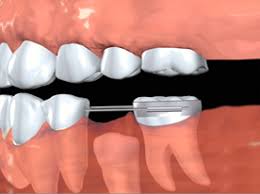Child Dental Care / Periodontics Dentistry
Pediatric dentists have had special training, which allows them to provide the most up-to-date and thorough treatment for a wide variety of children’s’ dental problems. They are trained and qualified to treat special patients who may have emotional, physical or mental handicaps. Because of this specialized training and commitment to comprehensive oral health, many parents wisely choose a pediatric dentist to treat their children. Our clinic provides dental care for children in a delightful, fun dental atmosphere.
The very young, pre-teens and teenagers all need a different approach in dealing with their behavior, guiding their dental growth and development, and helping them avoid future dental problems. The pediatric dentist is best qualified to meet these needs.
Sealants
Sealants are primarily a preventive treatment for the permanent teeth, not the milk or baby teeth. The first permanent teeth emerge between five and seven years of age. Another set comes about six years later. Teeth sealants last longer than four years for more than half of the children and young people who have them done. During this time the risk of cavities in the slot gacor sealed teeth is about halved. The resins applied as sealants these days are generally believed to be reasonably safe.
A space maintainer is made of stainless steel and/or plastic. It can be removable, or your dentist can cement it in your child’s mouth (called a fixed space maintainer). A removable space maintainer looks like a retainer. It uses artificial teeth or acrylic blocks to fill in space or spaces that need to be maintained. This type of space maintainer often is used when space is obvious to other people. Removable space maintainers work well in older children who can reliably follow directions about caring for this appliance.
Crowns
Two types of crowns are available and can be used in children. The first is the stainless steel crown, which is used to restore a largely decayed primary molar, or a pulpally treated molar. The second is the cellulose crown and is used to restore an anteriorly decayed incisor.
Orthodontic Treatments
Orthodontics is the branch of dentistry that deals with straightening and correcting the tooth alignment and the dental specialist who does this is called an “Orthodontist”.
Generally, the first Orthodontic consultation with a qualified Orthodontist should be done when the child’s first permanent incisors, usually lower central incisors, start erupting in the mouth i.e. at the age of about 7 years. After the complete evaluation of your child, the Orthodontist may suggest beginning with early Orthodontic treatment.
We offer simple and innovative plans to prevent children undergoing complicated procedures. Fixed appliances techniques available for children and adults from eminent orthodontists.



